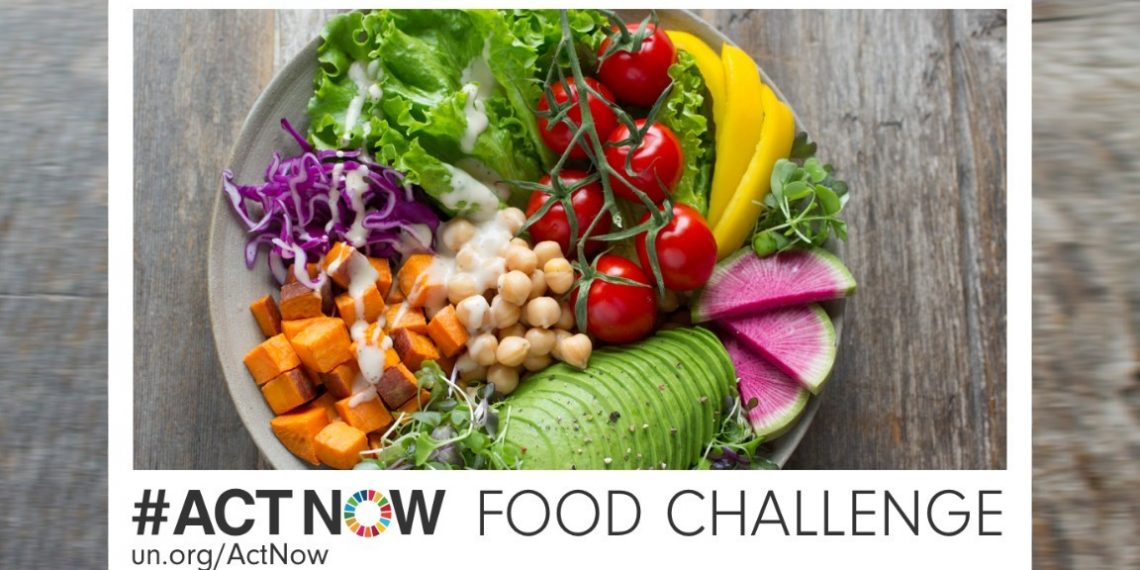The goal of ActNow is to educate and encourage individual behavioral change, mainly by adjusting consumption patterns. The decisions we make in our daily lives affect our planet. By changing our habits and routines, and making choices that have less harmful effects on the environment, we have the power to confront the climate challenge.
Food Challenge – Cooking Up Climate-Conscious Creations
Chefs from around the world will help support the United Nations’s ActNow campaign by kicking off a food challenge on June 18, Sustainable Gastronomy Day. The Challenge aims to engage people in the global effort to tackle climate change through healthy and sustainable food choices. Leading chefs will spearhead the challenge and provide inspiration by presenting their own creations which will be featured on the United Nations’ platforms to create a global wave of culinary creativity as people share their favorite recipes and photos.
As part of the campaign, people around the world will be engaged to make their individual contribution to sustainable food consumption. The challenge: cooking up dishes that are not only delicious but also good for the planet and good for us– reducing meat and emphasizing diverse vegetarian ingredients instead. Leading chefs will spearhead the challenge and provide inspiration by presenting their own creations which will be featured on the United Nations’ global platforms and kick off a global wave of culinary creativity as people share their favorite recipes and photos.
Food – a key to curbing climate change
Joining the campaign is the Copenhagen-based sustainable food organization MAD, the International Fund for Agricultural Development, the SDG2Advocacy Hub, and Kitchen Connection, which are working to engage chefs in the sustainable food movement. With agriculture contributing to about one-fifth of global emissions, largely through food waste and meat consumption, the UN’s ActNow campaign will showcase the efforts and recipes of renowned chefs who are cooking with ingredients that can help reduce greenhouse gases and damage to the environment.
Food consumption is impacting the climate in many ways. The destruction of rainforests to create land for agriculture, along with growing demand for meat, are major contributors to increasing greenhouse gases. And one-third of the food that is produced in the world each year – approximately 1.3 billion tonnes at an economic cost of $940 billion to farmers, companies, and consumers – is lost or wasted, according to the UN’s Food and Agriculture Organization. Wasted food is responsible for roughly 8 per cent of global emissions – if food waste were a country, it would have the third largest emissions in the world. More and more chefs and other food suppliers are focusing on local and organic produce and shifting away from meat-heavy meals and fast food. They are joined by a growing movement of people changing the way they cook and eat. The UN’s ActNow campaign aims to inspire even more people to enjoy sustainable, climate-conscious and delicious food.
Breaking new ground on the defining issue of our time
ActNow uses advances in Artificial Intelligence (AI) to spur these behavior changes. The ActNow chatbot is an interactive tool that recommends everyday actions to reduce our carbon footprint – like driving less, buying local and seasonal produce, taking 5-minute showers, and eating less meat. The campaign breaks new ground not only through the use of interactive technology but also in pushing beyond online “clicktivism” to trigger concrete change.
Generating momentum and changing consumption patterns
Every climate action we take matters. The more people act, the bigger the impact. All the actions that we take, collectively, will add up and reduce emissions. And it will send a message to leaders, in government and business, that people want climate action, and are willing to take it. The collective actions will be presented at the Secretary-General’s Climate Action Summit in New York in September 2019.


